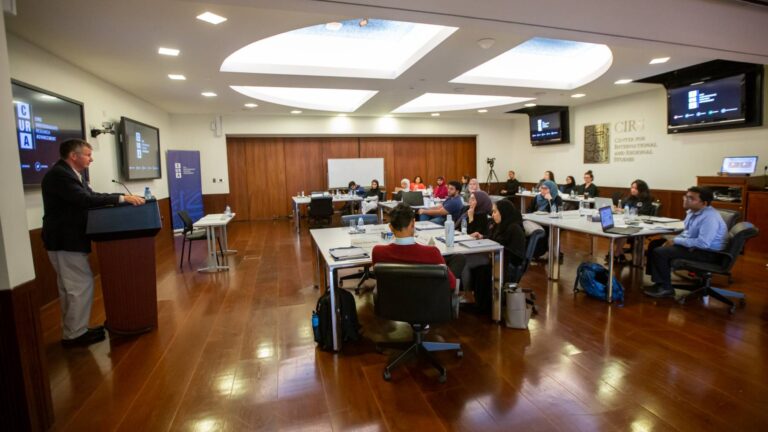Student Engagement
CURA Workshop: Evaluating Credibility: Sources for Academic Research

On January 23, 2020, CIRS hosted a CURA workshop titled, “Evaluating Credibility: Sources for Academic Research,” with GU-Q Professor Jim Reardon-Anderson and Librarian Paschalia Terzi. The workshop was focused on scholarly resource analysis and determining the authenticity of sources for research projects. Professor Anderson led the workshop and outlined some of his preferred techniques in determining the authenticity and validity of the sources. The workshop’s interactive nature made it a valuable learning experience. Furthermore, students gained substantial research strategy skills by engaging in this professional and encouraging environment.
Professor Anderson’s primary experience and scholarly insight further added to the meaningfulness of the workshop. He underlined how the right sources build on the internal validity and reliability and help strengthen the quality of the research project. Borrowing from his rich career experiences, Professor Anderson shared how he, as a researcher and historian, uses primary and secondary sources for his research projects. He outlined the necessity of a detail-oriented analysis to the research process, which benefited the students and encouraged them to be reflective of their own research experiences. His reflection prompted the students to understand the limitations of their research process and how to overcome some of the hurdles faced.
“The most useful and inspiring part of the workshop was Prof. Anderson’s personal description of what a researcher’s life is really like.” – Hussam Aitelqadi, sophomore at GU-Q.
Engaging with Professor Anderson, students questioned on how to accommodate the variety of sources available; for example, how to engage with multimedia resources such as newspapers, magazines, websites, and social media platforms, was one of the quires raised. Professor Anderson narrated how intersectional mediums and methods can boost one’s research and how students can benefit from the vast resources the Georgetown library provides. Hussam Aitelqadi, a sophomore at GU-Q who attended the workshop, commented on how participating in the workshop was an enriching learning experience. He reflected that, “the most useful and inspiring part of the workshop was Prof. Anderson’s personal description of what a researcher’s life is really like.” Another student, Jawaher Al-Sulaiti, also reflected on how the workshop helped her to gain a “better understanding of the tools of evaluation.”
In the second half of the session, GU-Q Librarian Paschali Terzi led the workshop through an interactive exercise. Building on Professor Anderson’s valuable insight, Paschalia showed students how to apply their practical learnings from the workshop. Students engaged with scholarly material and used a template to determine the credibility of the source. This was facilitated by accessing journals available on research databases and analyzing how social media can be used as part of research. This hands-on activity solidified the workshop experience; by immediately applying what they learned, students were able to practice new skills and receive feedback on their work from CIRS Staff and Paschalia. All in all, this workshop aimed at improving the overall research process of Georgetown University in Qatar’s undergraduate students.
Article by Khushboo Shah, CURA Administrative Fellow